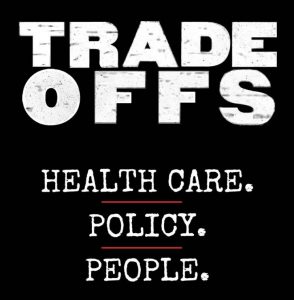 When it comes to fixing America’s costly and complicated health care system, the truth is: There are no silver bullets, no cure-alls. There are only Tradeoffs. That’s the name of a new health care policy podcast hosted by former senior health care reporter at Marketplace Dan Gorenstein, Harvard physician and economist Bapu Jena and Vanderbilt economist Sayeh Nikpay. The podcast combines academic research with compelling narratives to explore the complexities at the heart of our health care system. “Our show isn’t satisfied with the easy answer—we think it’s important to ask the trickier, messier follow-up questions too,” Gorenstein explained in a recent interview with the California Health Care Foundation (CHCF), a funder of the project.
When it comes to fixing America’s costly and complicated health care system, the truth is: There are no silver bullets, no cure-alls. There are only Tradeoffs. That’s the name of a new health care policy podcast hosted by former senior health care reporter at Marketplace Dan Gorenstein, Harvard physician and economist Bapu Jena and Vanderbilt economist Sayeh Nikpay. The podcast combines academic research with compelling narratives to explore the complexities at the heart of our health care system. “Our show isn’t satisfied with the easy answer—we think it’s important to ask the trickier, messier follow-up questions too,” Gorenstein explained in a recent interview with the California Health Care Foundation (CHCF), a funder of the project.
Episodes will be released every two weeks and will alternate between longer-form narratives and shorter expert interviews that center around new research or current policy debates. Two episodes have been released so far. The first focuses on the Urban Institute’s Health Insurance Policy Simulation Model. Through conversations with economists Linda Blumberg and Len Nichols, among others, the episode delves into the history of the microsimulation model and its most recent use, a new report comparing leading Democratic contenders’ health reform proposals. The episode explores who benefits from each proposal and who pays, disentangling the challenging decisions that voters and policymakers face in weighing imperfect options like Medicare for All and the public option. The second episode uses the recent antitrust case against hospital giant Sutter Health as a way into exploring the history of hospital consolidation and the effects it has had on health care costs and quality. It features interviews with economist Bob Town and legal professor Jaime King of UC Hastings.
The show is deeply grounded in research and backed by a scientific advisory committee which includes health economist Daniel Polsky, PhD, of Johns Hopkins University; Jill Horwitz, PhD, JD, of UCLA Law; Heather Klusaritz, MSW, PhD, Director of the Center for Community and Population Health at the Perelman School of Medicine; Harold Pollack, PhD, Co-Director of the University of Chicago Crime Lab; Amitabh Chandra, PhD, Harvard Professor of Public Policy; Rachel Werner, MD, PhD, Executive Director of the Leonard Davis Institute of Health Economics; and Chicago University health economist Katherine Baicker. By mixing research with rich storytelling Gorenstein hopes to concoct something special, as he told CHCF, “We hope to paint a more nuanced picture of our health care system that includes both its flaws and its strengths.”
The podcast is recorded at the Annenberg School for Communication at the University of Pennsylvania, with support from the Leonard Davis Institute of Health Economics and Center for Public Health Initiatives. Tradeoffs is also supported by the Robert Wood Johnson Foundation and the California Health Care Foundation.
Tradeoffs is eager to engage with the ASHEcon community and leverage the research and expertise of members. The team encourages members to share forthcoming peer-reviewed publications that could form the basis of an episode. They are especially interested in studies that contribute new or surprising evidence to debates actively occurring in Congress, companies, or communities. Example topics of interest include drug pricing, insurance design, the opioid epidemic, the social determinants of health, maternal health, and behavioral health.
Tradeoffs’ mission is largely educational and thus, they welcome the use of their episodes and web content in syllabi across the country. They would love to hear from members with ideas about how to incorporate the podcast into their curricula. Contact producer Leslie Walker with pitches, ideas, and feedback at lwalker@tradeoffs.org.
Listen to Tradeoffs on Apple Podcasts, Spotify, Google Podcasts and Stitcher, or at tradeoffs.org. For podcast updates, subscribe to the Tradeoffs newsletter and follow us on Twitter @tradeoffspod.
